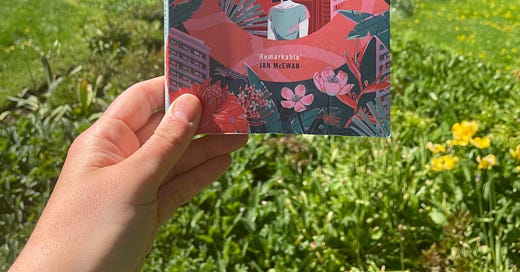📖 🇸🇬 #39: A Singaporean coming-of-age debut
Sharlene Teo on womanhood, relationships, and bodies
Welcome to Bookmarked, a weekly newsletter following my journey as I read one book from every country. If you like the sound of my project, I’d love it if you shared Bookmarked with a friend.
Set in Singapore, Sharlene Teo’s Ponti follows the intense and short-lived friendship of two sixteen-year-olds schoolgirls, Szu and Circe, as well as Szu’s “expertly cruel” and “glamorously sad” mother, Amisa. It’s a buzzy debut about womanhood, bodies, and selfishness with vivid descriptions of the intricacies of human relationships at its core.
In 2003, in a Singapore heated to an almost unbearable degree by Indonesia’s forest fires, a nouveau riche girl called Circe transfers to Szu’s school. Like Szu, Circe struggles to fit in with her peers and instantly the two girls develop an obsessive, all-consuming friendship, bonding over their shared loneliness and mutual contempt for their classmates.
Szu and I were sixteen, each other’s only friends in the world. We were symbiotic in the intense, irreplicable way that comes as part and parcel of being careworn teenaged girls; we wheedled and resented each other in fluctuating measures.
Circe is fascinated by Szu’s mother Amisa, a failed actress who previously starred in a trilogy of cult horror movies about Ponti, a beautiful, cannibalistic monster from Malay mythology. But the films didn’t reach a big enough audience and Amisa’s career never took off. Now dying and working as “sham medium” with her so-called sister Yunxi, Amisa is a shadow of her former self. More than anything, she’s sorely disappointed by motherhood.
Though the bulk of Ponti follows Szu’s adolescence, chapters of the book flash back to Amisa’s youth in the late 1970s and early 1980s and forward to Circe’s adulthood. In 2020, years after abandoning Szu in the wake of her mother’s death, we meet Circe as a 33-year-old divorcee who is working as a social media consultant. When a remake of the Ponti films is announced, Circe is asked to run the promotion campaign, forcing her to confront old memories of Szu and Amisa and reflect on how she treated Szu back when the girls were teenagers.
All of the women in Ponti are betrayed by their bodies to some degree—while Szu is horrified by the changes that come with adolescence, Amisa’s cancer is spreading and, in the future, Circe battles with a tapeworm infection.
Teo writes about the confusion and distress of being a teenage girl expertly. “I’m not exaggerating when I say that we were only sixteen but I felt like we’d been through decades,” Szu says of Circe. Later, Circe reflects: “The truth is, Szu and I told half-fictions to each other. We were complicit in our mutual exaggerations.”
She also does a particularly good job of describing everything these woman encounter as utterly disgusting: an arcade smells of “vomited popcorn butter and toilet bleach;” a classroom is described as hot enough to make “us sweat out half our body weight, a form of suffering which the girls most committed to their eating disorders view as beneficial and beautifying;” aging is akin to being one year closer to “gums drawing away from yellowed canines”.
Ponti is a sharp, funny, sad, arresting book. Teo’s writing is gorgeous and the backdrop of horror movies, mythology, and the psychic industry gives the book a really interesting depth. If you like character-driven stories and plot lines that don’t neatly resolve, it’s definitely worth your time. I loved it.
Ponti by Sharlene Teo (Picador, 2018)
More books by Singaporean authors:
Bury What We Cannot Take by Kirstin Chen
Dream Storeys by Clara Chow
Suicide Club by Rachel Heng
Sugarbread by Balli Kaur Jaswal
How We Disappeared by Jing-Jing Lee
Delayed Rays of a Star by Amanda Lee Koe
The Gatekeeper by Nuruliah Norasid
Fascist Rock: Stories of Rebellion by Claire Tham
The Lights That Find Us by Anittha Thanabalan
The Frangipani Tree Mystery by Ovidia Yu
What have you read recently?
If you’ve read a brilliant book in translation or you’d like to pass on a recommendation, I’d love to hear about it! For this project, I’m focussing on contemporary fiction and short stories, with a preference for female authors—but I’m always happy to venture further afield for a good recommendation.
You can get in touch by replying to this email or leaving a comment. I’ll be featuring your recommendations in upcoming newsletters, and I’ll keep a growing list here.
Bookmarked is written by Tabatha Leggett. If you know someone who would enjoy this newsletter, please forward it to them!




